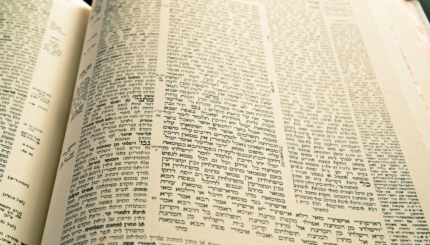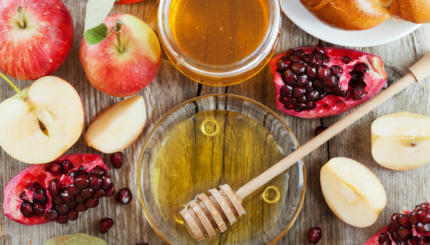“Are you going to fast on Yom Kippur?” “Are you going to try not to eat until chatzot, midday?” These were the questions my friends and I were discussing around the age of 10 and 11. We had never considered that there would be a period of time in our future when we would have to ask those questions again. As an 11-year-old, I proudly shared that I fasted before I was obligated. It wasn’t until over a decade later that I would begin grappling with these questions again.
Although the questions remain the same, the circumstances and process for coming to an answer has changed. As a child, I did not ask a rabbi what I should be doing. I knew the general custom and practice amongst my peers, and made my own decision accordingly. I did not feel an ounce of guilt if I broke my fast early. Ironically, the process looks very different for adult women who are either pregnant, nursing, or trying to conceive.
As Yom Kippur is rapidly approaching, a number of articles and posts on this topic have arisen. Maharat Rachel Kohl Finegold, who has spoken on this issue in the past, recently published “Pregnant and Nursing Women Fasting on Yom Kippur-Reflections” on Morethodoxy.
This piece followed her shiur, “Fasting for Two: Who Makes the Call?”, disseminated by JOFA this past Tisha B’Av. Her shiur spurred a great discussion on my personal Facebook wall. Women shared stories of reluctantly fasting, nervous of the effect that it would have on their unborn children or their nursing supply. I recall one woman in particular giving an hourly update of the wails of her nursing child. She had decided that since her child was almost one year old, and eating supplementary food, that she would fast. For whatever reason, her child was refusing solid food on that particular day. The mother had made her decision before the fast, and despite the change in circumstances, would not revisit her decision. It was painful to read her account on that day.
We all make our own decisions of what to eat when pregnant, how to exercise, what to exclude from our diets, whether or not to nurse, etc. Fasting while pregnant or nursing seems to be a decision unlike others. This is one area with which many observant women, throughout the spectrum of the Orthodox community, grapple and are left feeling uneasy no matter the outcome. Guilt is always the result. Women feel guilty for “breaking the fast early” or for not properly nourishing their children. Even if breaking the fast entails eating according to defined shiurim (a halakhic measurement of food permissible according to biblical law) once an hour, the guilt remains. If one chooses to fast for the duration, the guilt remains.
One cannot ignore the spike in pregnant women being admitted to the hospital during and following Yom Kippur. While it may be “okay” to fast while nursing, it can, and has, lowered or diminished milk supply for many women, including a number of women that I know.
A good friend of mine was eagerly following the Facebook discussions born from Maharat Kohl Finegold’s shiur. She had already been nursing her then nine-month-old, and decided to fast on Tisha B’Av. She knew that she wanted to wean him in the coming months, and figured that it would seem inauthentic to eat on Tisha B’Av with that in mind. She was uncomfortable because she felt as if she was trying to rationalize why she should not have to fast without any strong support for this decision. This led to her coming to a stringent decision to completely abstain from water and food throughout the fast day. While she had been nursing her child three to four times a day, her child refused to nurse from the tenth of Av and on. She is not positive why it ended, but, most likely, it was because her milk supply had diminished. Anecdotally, my friend’s story is far from unique.
As children, we were confident in our decisions whether or not to fast, because we were not halakhically obligated. As noted in the articles cited below, there are both halakhic and health factors that mothers should take into consideration. Just as mothers research strollers, baby gear and the like, we should put effort into researching and coming to a decision on whether or not to fast. Mothers asking this question should read the articles mentioned below and think about this decision in advance of the fast day. Making the decision at the last minute contributes to a sense of uneasiness and urgency.
While I am not a medical or halakhic authority, below are a number of items to consider and questions to ask your trusted physician and halakhic authority:
- How far along are you in your pregnancy?
- Is your pregnancy high risk?
- See your doctor or midwife before the fast to ensure that your baby’s prenatal vitals are in good shape.
- Ask your doctor if there is anything else that they think you should know. Are there any risks involved in fasting? Any relevant studies?
- What risks are involved for the child of a nursing mother? For a pregnant mother?
- How old is the child that you are nursing? Does this affect your decision?
- If you need to drink/eat any amount during the fast, what should you drink/eat? (I would suggest a protein drink or the like.) Where should you drink/eat?
- What halakhic options are available to you on general fast days? How do things differ on Yom Kippur?
- While you have a “game plan,” what should be your action plan if your situation changes during Yom Kippur? Will you eat or drink? Will you decide to stay home? What are options or issues that may be a consideration?
Some suggestions to make the fast easier:
- Prepare by drinking extra water the day before the fast.
- If possible, make sure that you will have extra help for your children and any other responsibilities that would put extra strain on you during the fast day.
It is time for us to recognize that our bodies and our children are holy vessels. The same way that we make decisions about where and how to pray, what minhag, custom, to follow, and how to observe halakha, we need to take ownership over this decision.
It has pained me to read and hear the words of women sharing their level of pain or discomfort, or the cries of their nursing children who are hungry. Women who ask rabbis whether they should fast are sometimes told to fast until they become sick or until it would affect their milk supply. Most women, most people, cannot answer that.
The halakhic process is best lived out when we are in dialogue with modern medicine, attuned to our own health needs and have access to well trained, compassionate, and knowledgeable poskim and poskot, halakhic decisors. There is an ever expanding network of Maharats, Rabbis, Yoatzot Halakha and other klei kodesh, spiritual leaders, who welcome a genuine and mutual conversation on these important and sensitive subjects. When we, as women and mothers, are empowered in this conversation the entire halakhic process benefits.
Further reading:
‘Does Fasting Put Pregnant Women at Risk?’
BabyCentre on Fasting in Pregnancy
Doctors: Fasting during all but last weeks of pregnancy increases risks
Effect of a 24+ hour fast on breast milk composition
Fasting on Yom Kippur During Pregnancy by Hannah Katsman
Impact of maternal fasting during Ramadan on growth parameters of exclusively breastfed infants Journal of Fasting and Health. 2013;1(2):66-69
Teshuva from Rav Nachum Rabinovitz, Rosh Yeshiva of Maaleh Adumim
Av
Pronounced: ahv, Origin: Hebrew, Jewish month usually coinciding with July-August.
Yom Kippur
Pronounced: yohm KIPP-er, also yohm kee-PORE, Origin: Hebrew, The Day of Atonement, the holiest day on the Jewish calendar and, with Rosh Hashanah, one of the High Holidays.


